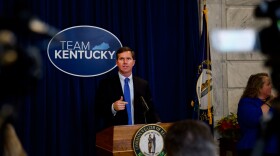Newly posted online data show Louisville Metro Government has spent at least $8.2 million on personnel, supplies and other costs of responding to the COVID-19 pandemic.
What, specifically, the city is buying during the pandemic is not included in the data, and city officials denied KyCIR’s request for more detailed spending records. The city’s website notes the spending data is “fluid, constantly changing.” Some expenditures represent bids for supplies, for example, and could ultimately be removed if city officials lose the bid.
But the spending data does provide a glimpse into how local officials are working to respond to the pandemic, which has infected more than 1,500 people in Louisville and killed at least 108. Personnel costs are ballooning, and city leaders are tapping an array of companies for a range of supplies — from medical equipment to portable toilets.
City officials did not respond to a request for an interview for this story. Ed Blayney, the city’s Civic Technology Manager, said on Twitter that the online database will be updated every Friday.
The city’s fiscal response began on February 28, about a week before the first case was confirmed in Kentucky, with a $977 cost for personnel from the city’s Department of Public Health and Wellness. Since then, personnel related costs have climbed to an estimated $2.2 million in the fight against the COVID-19 pandemic, according to the city’s records.
The city’s police department has tallied the highest bill for personnel — just more than $480,000, even though officers are making fewer arrests and issuing fewer citations during the pandemic, according to police data. Officers also stopped responding to certain in-person calls for service in the early weeks of the pandemic. A police spokesperson did not respond to a request for comment for this report.
On March 10, the data show what looks to be the city’s first expenditure for supplies, from Bound Tree Medical LLC, a medical equipment supplier based in Ohio that’s long done business with Louisville Metro Government.
After that, daily estimated expenses climbed, peaking at $536,000 on March 30, two days after Gov. Andy Beshear announced the then-largest single day spike in new statewide COVID-19 cases. On that day, personnel costs topped $65,000 and city officials made its biggest health department purchase: $457,500 to a vendor listed as CNExpress, a relatively obscure entity with little online footprint that doesn’t appear to have done business with the city before.
Around the same time, Beshear was bemoaning that local and state governments were being forced to compete with the federal government for medical supplies, such as personal protective equipment necessary to protect health care workers from infection. Other local governments have turned to obscure or unknown companies for supplies during the pandemic.
The spending records show CNExpress received more money than any other vendor in the city’s fight against COVID-19. In all, the company has received an estimated $1.5 million.
By April, the city was spending an estimated average of nearly $158,000 each day fighting the pandemic. The data also indicates that Louisville Metro, like other government agencies, is scrambling for supplies as the pandemic continues to spread. City officials have spent more than $50,000 purchasing supplies off Amazon, and thousands more at Walmart, The Home Depot and Sam’s Club.
Some purchases have come from long-time vendors, such as Leonard Brush and Chemical, a local cleaning supply company. Other purchases, though, have come from unfamiliar companies, like Genview and XP Trading Co, two companies that collectively received more than $700,000 in estimated expenses. City records show neither company has done business with the city in recent years.
City officials also appear to be providing food for staff working long hours to keep up with the demands of responding to the pandemic. The spending records show nearly $5,000 in estimated spending by the MetroSafe Department on pizza, pasta and other food from Bearno’s, O’Shea’s and Sicilian Pizza and Pasta.
Thousands of dollars have also been allocated to utility providers and landlords through the city’s Office of Resilience and Community Services, which manages the city’s programs aimed at helping people who are struggling to pay bills. Louisville Gas and Electric has received an estimated $65,000 and the Louisville Water Company has received an estimated $28,000, records show.
Under normal times, most purchases greater than $30,000 require approval from the Louisville Metro Council, according to the city’s purchasing policy. But during an emergency, the policy is modified. The mayor can administratively approve purchases greater than $10,000, and purchases under $10,000 can be approved at the department level during an emergency.
The city’s online records show 34 purchases that would require mayoral approval.
Michael Schnuerle, who until last month was the city’s chief data officer, said on Twitter that Louisville is perhaps the only city to publish spending data at this level. Now, Schnuerle is the director of open source operations for the Open Mobility Foundation.
“My bet is full details will come later,” he said. “With COVID response and budget cuts and furloughs everyone’s doing 2-3 jobs: Theirs plus new work.”







